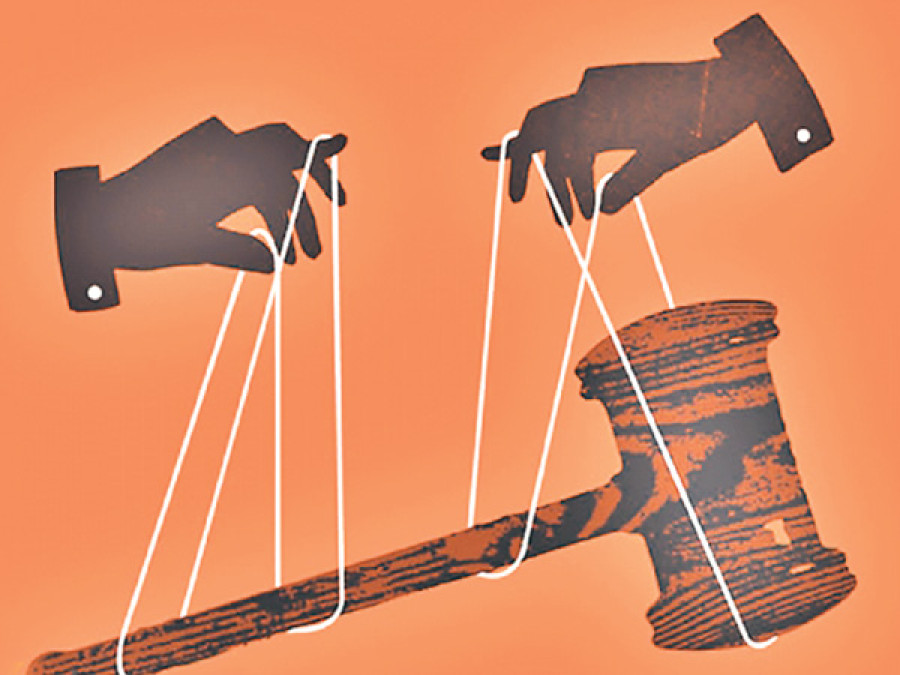Opinion
Realigning justice
Presently, the SC finds itself with only eight judges, although the stipulation is that there should be at least 20. Moreover, at a given time, only around five judges are available in the bench
Krishna Man Pradhan
Since promulgating the constitution last year, the government has been stating that its main priority now is to implement the document. However, the most important aspect of the constitution has been left non-functional during the last nine months.
For the first time in history, the Supreme Court (SC) is headed by a woman Chief Justice. But the institution of the Supreme Court is reeling under political backlash—from criminal indifference to its state to public utterances undermining its dignity.
This is affecting the day-to-day justice dispensation, putting tens of thousands of common people in utter inconvenience. Let me briefly present a sordid picture of how the apex court is turning almost dysfunctional.
Presently, the SC finds itself with only eight judges, although the stipulation is that there should be at least 20. Moreover, at a given time, only around five judges are available in the bench. Over 22,000 cases are pending. As such, on average, a judge or bench is now expected to decide upon over 50 cases every day. But a bench can manage to sort out only about five a day. It leads to a huge backlog and tremendous difficulty for the ordinary petitioners who come to the Capital from every nook and corner of the country hoping that their cases will be settled by the apex court. These poor fellows have to arrange money to travel to Kathmandu, stay in lodges and then go back frustrated.
Political bickering
Over three months ago, the Judicial Council had recommended 11 judges for the Supreme Court—seven from among the chief judges of appellate courts and four from among legal luminaries. The chief judges were selected from among the capable, honest and efficient judges. The legal luminaries had an impeccable public track record as well. Barring a few complaints regarding political affiliations of some nominees, even the media seem to have supported their recommendation. However, the recommendations are still pending.
Likewise, two months ago, Sushila Karki was recommended by the Constitutional Council for the position of Chief Justice. Due to technical considerations, she was actually recommended twice by the Council. This also was an unprecedented move. But she still continues to head the Supreme Court as acting Chief Justice—which definitely affects her zeal and prestige.
The delay in the appointment of the SC judges and the Chief Justice is due to the political bickering over the formation of the Parliamentary Hearing Committee that needs to approve their recommendations before they can be appointed.
The impasse
Previously, there was a 75-member hearing committee—whose number could be changed on the basis of recommendations by the Business Advisory Committee of Parliament—formed on an inclusive basis to conduct the hearing. The new constitution, however, stipulates that the hearing committee should comprise 15 members—including members from both houses of Parliament.
The difficulty now is in the formation of the new committee as per the new constitution. Since there is no Upper House at present, the opposition parties have been asserting that the old hearing committee should be continued for the transitional phase. The ruling parties, on the other hand, are saying that a new 15-member hearing committee should be formed.
The tug-of-war has resulted in an acrimonious situation. Although this matter does not seem to be intractable from any angle, their bickering has continued to everyone’s despair.
It seems the parties have other hidden agendas that are responsible for the current impasse. It is an open secret that since the very beginning, certain parties including the Nepali Congress were not happy with the composition of the Judicial Council as well as the 11 nominees. Although these parties have not publicly stated their disagreement to the 11 nominees, they have been giving venomous response towards resolving the dispute over the hearing committee—which has to be settled by approving new rules for Parliament.
In recent weeks, the Speaker of House, Onsari Garti Magar, has been taking initiatives to break the deadlock. She recently called the meeting of top leaders of both the ruling and opposition parties, and the two sides have assured that they will try to resolve the matter before June 19 (that is, today).
Way forward
It is hoped that the ruling and opposition parties are able to resolve the matter of the hearing committee and parliamentary rules amicably. If that does not happen, the matter could also be resolved through voting.
Whatever is the course, the main point here is the end result. The judiciary is slowly turning dysfunctional. Moreover, political leaders are publicly rebuking the Supreme Court for the delay in resolving certain cases related to the nomination of 11 judges. This is ironical. On the one hand, the political leaders are not allowing the appointment of judges to go through; on the other hand, they are complaining about delay in the settling of cases.
In any case, this is not the time for quarrelling. If the political leadership is intent on implementing the new constitution, it must put the state of judiciary on the right track.
Without a functional judiciary, the smooth implementation of the constitution and the consolidation of inclusive democracy are not possible. Therefore, the first duty before the political leadership is to end the unnecessary dispute and pave the way for the formation of the hearing committee—either through consensus or through voting. And if and when the new hearing committee is formed, all the parties should promptly forward their members to the committee and help the process of appointment of judges.
Pradhan is Executive Director at Nepal Law Society. He can be reached at [email protected]




 9.6°C Kathmandu
9.6°C Kathmandu










